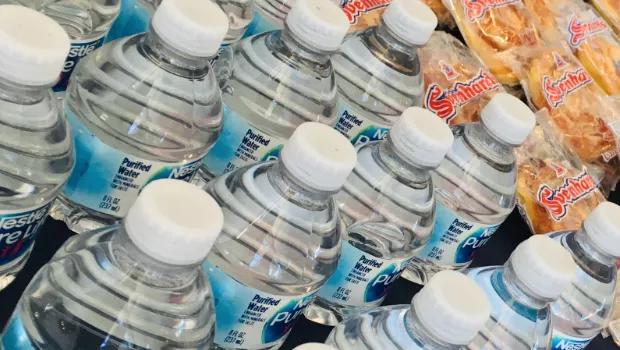June 27, 2024
Plastics are made to last forever. Yet, many of the products are used only for a few moments. When plastic enters the environment, it breaks up into smaller and smaller pieces that act as magnets for harmful chemical pollutants and become dispersed in the air, water, soil, and ocean, entering the food chain for people and wildlife. Plastic has been found in drinking water, food, and human breast milk, placenta, lung, blood, heart, liver and gut tissues.
From production to disposal, plastic poses environmental and public health threats at every stage. Just to give a few examples: pollution during the extraction of fossil fuels used to make plastic; air and water pollution from petrochemical plants; spills of pre-production plastic pellets during production and transport; pollution from incineration or landfilling of plastic waste; exporting plastic waste to third-world countries; and the plastic that enters the environment — including an estimated billion pounds of plastic that enter the oceans every year. Environmental justice communities located near chemical and plastic production facilities and incinerators suffer disproportionate harm from plastic pollution. Chemicals that are a part of plastic production put fenceline communities at a higher risk of developing cancers, developmental and reproductive problems, and nervous system impairments. If current plastic production trends continue, the U.S. plastic industry’s greenhouse gas emissions are expected to outpace that of the country’s coal-fired power plants by 2030.
Sierra Club has a number of campaigns that are in connection with plastic reduction, such as Beyond Dirty Fuels and Fossil Free Finance. Legal action has also been taken against the Coca-Cola Company (bottler of Dasani), BlueTriton Brands (bottler of Arrowhead, Poland Spring, Deer Park, and Ozarka), and Niagara Bottling (bottler of Niagara and store brands). Club members across the country have long been advocating for legislation and programs aimed at plastic reduction.
- Between 2022 and 2024, Sierra Club and dozens of allies sent five requests to the U.S. General Services Administration and Department of the Interior, on phasing out the procurement, sale, and distribution of single-use plastic products and packaging. Our engagements with state and local governments started even earlier. And in 2023, 10 chapters in the country received Sustainable Event Awards for implementing Sierra Club California's sustainable event resolution, which shares the overarching goal of reducing plastic consumption.
- Club members across the country have played a significant role in passing laws that prohibit the sale, distribution and use of single-use beverage bottles, balloons, etc.
- Alongside dozens of organizations, The Angeles Chapter supports City of Los Angeles’ Comprehensive Plastics Reduction Program, which includes banning single-use printer cartridges.
- While not all battles have been won, we continue to advocate for the mitigation of microfibers shed or fragmented from polyester, nylon, and rayon textiles, which pose a significant threat to both oceans and farmlands. Synthetic microfibers are one of the most dangerous forms of microplastic.
- Open window envelopes (without plastic) are readily accessible options.
As the largest environmental organization in the country, Sierra Club's procurement standards hold significant sway in the NGO sector. It strengthens our position to advocate for government adoption of similar procurement policies targeting plastic pollution. Such alignment between NGO practices and government policies would more effectively lead to the enactment of laws aimed at reducing plastic pollution.
In May, Angeles Chapter proposed a resolution titled Plastic Procurement Reduction to the national Club.
The Council of Club Leaders requests the Board of Directors to discontinue procurement of plastic products to the greatest degree possible, including, but not limited to, plastic bottled beverages of one gallon or less, envelopes with plastic windows, single-use printer cartridges, balloons, clothing sold by the Club made entirely or partly from synthetic materials such as polyester, nylon or acrylic, not intended for outings, starting in 2025.
The Council of Club Leaders is seeking feedback on all 2024 draft resolutions before voting in August. Approved resolutions will then proceed to the national Board for formal policy development. While this process may seem lengthy, we can slash more plastic purchases now - no policy needed! Share this message far and wide with all Sierra Club entities, local governments and others.
Need some encouraging news? Having made such public comments numerous times over the years, this month, the City of Laguna Beach included a mandate in the draft Climate Action and Adaptation Plan: “large events permitted by the City must be zero-waste.”
Yes, together, we can spark a widespread social trend of sustainability.
Simone Kuhfal Schmidt is a member of the Sierra Club Sierra Club California Zero Waste Committee.
